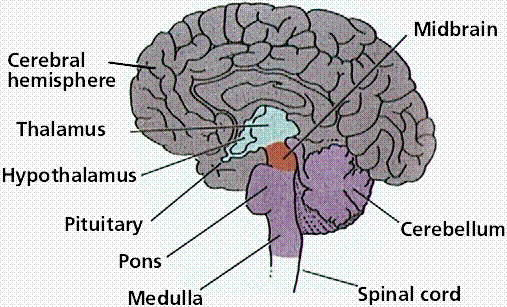It is not unusual to become depressed after stressful experiences. When something happens, your brain controls your psychological and behavioral responses by evaluating how threatening an event is. The way your brain reacts to stress is usually essential for your survival, because it gives you extra energy to fight or flee from dangerous situations. However, if brain chemical levels that increase during stressful situations stay elevated for a long period, it may cause problems such as depression. Depression can make a person feel sad and even cause damages to the brain.
How Does Depression Affect the Brain?

1. Shrink of Hippocampus
The hippocampus is an important part of your brain and is usually considered the center of memory, emotion, and the autonomic nervous system. It responds to stress hormones, and the production of new neurons slows down due to repeated stress. Therefore mental disorders such as depression can cause it to weaken or shrink, which can lead to several complications.
2. Shrink of Prefrontal Cortex
Located at the front of your brain, the prefrontal cortex plays a big role in executive functions such as decision-making, judgment, and problem solving. It also helps control emotions and memory. Depression can affect its function and weaken it over time. This leads to atrophy of neurons in this area and the prefrontal cortex eventually shrinks.
3. Enlargement of Amygdala
The amygdala is a part of the limbic system, and this system is a group of structures in the brain and is associated with emotions, including pleasure, anger, fear, sorrow and sexual arousal. The amygdala becomes activated when you recall emotional charged memories. Activity in this area increases when you are clinically depressed or sad, and over time this can lead to enlargement of the amygdala.
Can Brain Changes Be Reversed?
Knowing how does depression affect the brain is important, but it is equally important to know if you can reverse those changes. Fortunately, it is possible to reverse those changes with the help of proper treatment for depression.
1. Exercise Regularly
Regular exercise improves mental health by boosting the production of "feel good" hormones and normalizing insulin resistance in the body. It also helps boost neurotransmitters that are directly associated with mood control, such as serotonin, endorphins, glutamate, dopamine, and GABA (Gamma Amino Acid Butyric Acid). You can also eliminate stress chemicals through regular exercise. Moreover, it helps increase the volume of gray matter in hippocampus, which can improve the brain's ability to produce new cells, thus reversing the damage done to your hippocampus.
2. Pay Attention to Your Diet
How does depression affect the brain? Now you know the answer, then how to reverse the brain changes? What you eat can affect the way your brain works. If you are already under stress, eating wrong types of foods is only going to make matters worse. Many people tend to overeat when they are depressed, so you need to keep an eye on how much you eat. Include foods rich in omega-3 fatty acids in your diet, and some best choices are tuna and salmon. Similarly, foods that contain folic acid such as avocado and spinach may also help ease depression.
3. Get Enough Sleep
Not getting enough sleep can amplify your depression symptoms. The problem is that you will have a hard time sleeping when you are in depression, and too little sleep will further aggravate the whole problem. To solve this, you should work on setting and following a sleep routine. Avoid napping during the day and ensure that there are no distractions in your bedroom to help fall asleep with more ease.
4. Do Not Ignore Your Responsibilities
It is easy to overlook your responsibilities when you are dealing with clinical depression. While you may want to give up your responsibilities at work and at home, you should resist the urge and stay involved all the time. Taking your responsibilities actually keeps you busy and help you maintain a better lifestyle. Successful completion of these responsibilities may also give you a sense of accomplishment that helps counter depression.
5. Overcome Negative Thoughts
When you are in depression, it is hard to keep your thoughts in control. The idea is to change how you think. Depression can make you think about the worst possible conclusions. In most cases, you can counteract this by using logic. Do not just start thinking that no one likes you, instead ask yourself if there is any evidence for that. It definitely needs practice to challenge negative thoughts, but you have to learn it to take control of your life.
6. Keep Yourself Busy
You can keep yourself busy by doing something new. Start a new hobby; go out with friends; get your favorite book and read it; or take dancing or language classes. Keeping yourself busy helps make your mind distracted and raise the levels of dopamine that is associated with enjoyment, pleasure, and learning.
7. Take Antidepressants
Knowledge about how does depression affect the brain pushes you to take steps to get out of this situation. While you can make lifestyle changes to deal with your depression, it is sometimes necessary to take medications. Talk to your doctor and they will prescribe medications as per your symptoms. Some of the most commonly prescribed antidepressants include SNRIs, NDRIs, and tricyclic antidepressants. Be sure to get more information about the side effects of these medications before you start taking them.
